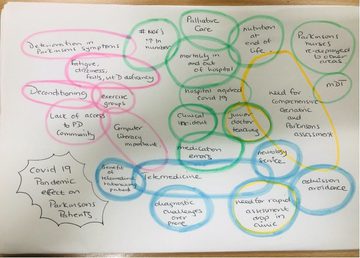The Pandemic and Parkinson's
Poster
Poster Writeup
Purpose. This qualitative explorative study looked at the impact of the Covid 19 pandemic on patients living with Parkinson’s Disease (PD). It explored the positive and negative aspects of the change to peoples lives and the care provided from the hospital following the 2020 and 2021 pandemic lockdowns. It explores the factors and themes that emerged from the data and has helped to develop ideas for further service development between neurology and geriatric departments in our hospital . This project was completed as part of the Advanced Parkinson’s academy masterclass.
Methods. Ethnographic methods were used to collect data from one interview with a hospital-based PD nurse about her understanding of the impact of the Covid 19 pandemic had on the population of Parkinson’s disease patients that she looks after. The data came from a verbal face to face interview. Questions were open ended questions and then further questions asked based on the response and themes emerging. Particular attention was paid to stories that were told about a patient’s journey and scenarios that were encountered during this time.
Analysis:
Grounded Theory and Thematic Analysis were used to analyse the data. This allowed me to look at what was said to identify emerging themes and follow these through whilst the research progressed.
Analysis of the interview data allowed me to see that themes arose. Initially these data were grouped into 40 data points then into 22 subthemes.
The 22 subthemes are bubbles below. I then grouped these further into related and associated themes that overlap and interplay with each other. See diagram 1.

Diagram 1
Results:
Theme 1 – Lockdown losses. (Pink in diagram 1) This focuses on subthemes that came out of community losses due to lockdown and shielding. Such as physical deconditioning, lack of access to community and support groups, patients who lack computer literacy affected more, leading to deterioration in PD symptoms.
Theme 2 – Hospital harm (Green in diagram 1) This theme arose from subthemes and stories around medication errors in hospital transcription of medications, hospital acquired covid infection, clinical errors, redeployment of specialist nurses to other roles due to covid 19 service pressure. These harms can de directly related to covid or collateral damage for service disruption.
Theme 3 – Telemedicine (Blue in diagram 1). The benefits of using telephone communication helped identify patients that could have a more flexible approach to clinic for example streamlining more stable patients and avoiding unnecessary visit but also challenges such as diagnostic uncertainty over telephone, lack of visual clues, unable to see medication boxes, not being able to be physically examine.
These themes are not stand exclusively and overlap and interplay with each other. From these themes ideas for service development have emerged. These have been highlighted in orange in diagram 1.
Conclusions and service development. The outcomes of this study provide insights, into the experiences of a PD nurse caring for patients with PD throughout the pandemic. Lockdown losses, Hospital acquired harm and telemedicine. From these themes I have been able to identify many areas where we could do further service development work. I have focused on three which are highlighted in Orange in diagram 1.
- M&M discussion of clinical incident for learning for the Multidisciplinary team and junior doctor teaching.
- Explore the need for a ‘Comprehensive Parkinson’s assessment’ to be done and that the skills of the MDT including a geriatrician could help communication and care.
- Explore the need for a ‘Rapid access Parkinson’s clinic’ or for urgent slots to be available in regular PD clinics to supplement telemedicine working for patients that would benefit from a safe face to face consultation.
More Parkinson's Academy COVID-19 Projects
'The things you can't get from the books'
Parkinson's Academy, our original and longest running Academy, houses 23 years of inspirational projects, resources, and evidence for improving outcomes for people with Parkinson's. The Academy has a truly collegiate feel and prides itself on delivering 'the things you can't get from books' - a practical learning model which inspires all Neurology Academy courses.